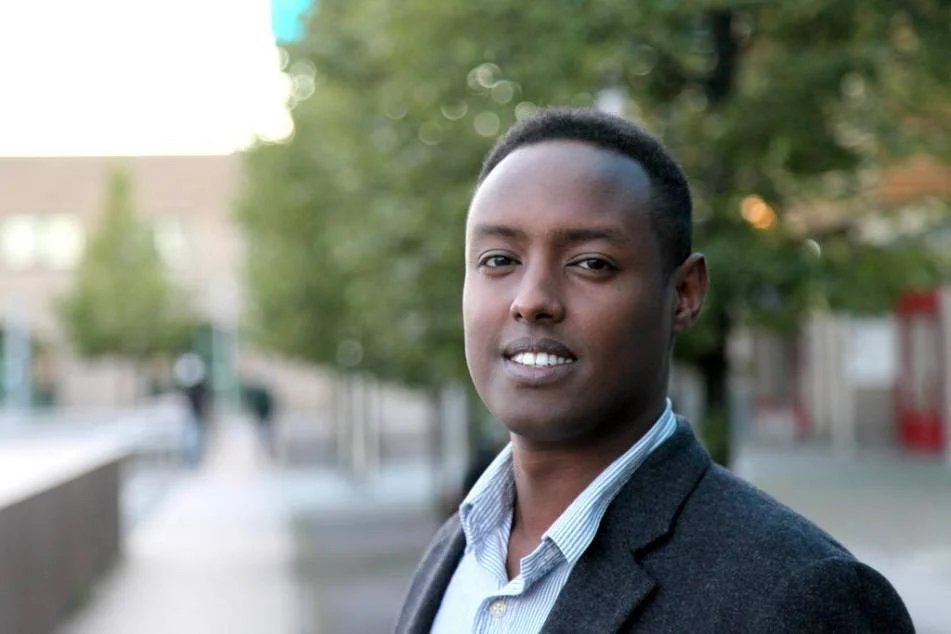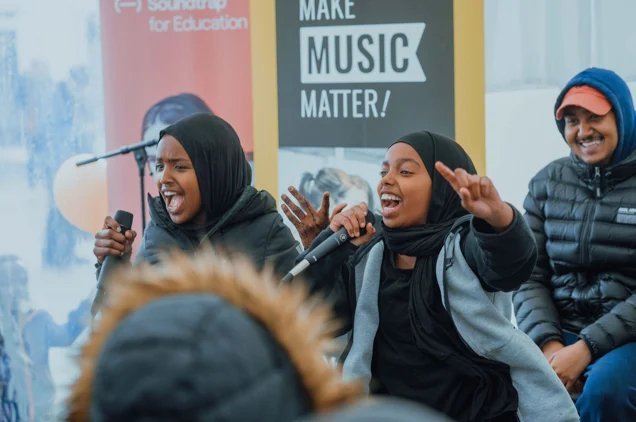Alumni Spotlight: Ahmed Abdirahman, Class of 2007
Ross School alum Ahmed Abdirahman perfectly exemplifies the power of Global Citizenship and service within one's community. While Ahmed's Ross School experience and path to success were quite unique, he attributes his passion for international relations, diversity and inclusion, and politics to spending some of his most formative years at Ross School and working alongside Ross founder, Courtney Sale Ross. Joining the Ross community granted Ahmed a newfound sense of security, community, and family––primarily thanks to the unwavering support he received from his new Hamptons family, both Courtney and Nicole Ross.
Ahmed was born in Mogadishu, Somalia and immigrated to Sweden during his youth with his mother and younger brother. The suburb of Stockholm, Tensta, was where Ahmed attended secondary school and was first introduced to Ross School at his school, Tensta Gymnasium. From the years of 2003 to 2016, Ross School partnered with Tensta Gymnasium to create Ross Tensta Gymnasium. Ross School established this partnership with Tensta Gymnasium with the intention of supporting Ross' global education initiative while targeting Tensta's diverse population.
Through a scholarship from Courtney Ross, Ahmed was able to attend Ross School's Postgraduate program with the goal of pursuing a higher education from one of the many great universities in the US. Upon graduating from Ross, he attended Marymount Manhattan College to study International Relations. He graduated with his Bachelor's Degree in 2011. Ahmed then went on to complete his Master's Degree at Fordham University with a focus on International Humanitarian Action. While pursuing his Master's Degree, he put his education on pause to gain hands-on experience in the field so he went back overseas where he started working with Interpeace in Switzerland.
His great work in the international politics, relations, and peace-building world snowballed into incredible opportunity after the next—which leads Ahmed where he is today, the founder and CEO of Stiftelsen The Global Village Foundation, a non-profit organization empowering people in Sweden of all backgrounds and origins to become more politically aware, educated, and involved.
Annie Lööf (left), Swedish politician, lawyer, and member of the Riksdag (the national legislature and the supreme decision-making body of Sweden) with Ahmed (right).
Ulf Kristersson (left), Leader of the Opposition Party and Leader of the Moderate Party with Ahmed (right).
Tensta is a district comprised primarily of migrants, refugees, and immigrants who came to Sweden out of necessity and in hopes of finding a better quality of life. Tensta is one of several immigrant-majority districts in Sweden which, following Sweden's largest refugee crisis in 2015, has gotten a bad rap as a seemingly "dangerous" location in Sweden, despite being a part of the notoriously safe and idyllic city of Stockholm.
Sweden's refugees and migrants have steadily migrated and sought asylum from countries across the globe since the turn of the century, but most noticeably between 2011 and 2019, leading up to the global pandemic. In 2015 alone, Sweden welcomed over 163,000 refugees from the Middle East and North Africa, most of them coming from Syria, Iraq, and Afghanistan amid the refugee crisis. Today, these migrant communities clash with many traditional Swede communities—causing political unrest, public protests, and violence. According to Ahmed, the generalizations and stereotypes of refugees, migrants, and immigrants among Swedes, stem from racism and misunderstanding.
Ahmed articulates that as humans, there are more things that connect us to one another than divide us. While The Global Village Foundation currently unifies people across Sweden, Ahmed has his eyes set on the bigger picture. He sees his efforts paying off as The Global Village Foundation's reach expands into the rest of Scandinavia, Europe, and soon, hopefully beyond.
Through Stiftelsen The Global Village Foundation, Ahmed has been able to survey Sweden's most "vulnerable" populations to understand where their social, political, educational, and financial needs lie. Each year, a full report is compiled from all of the survey results which help inform political and social initiatives—some of which are spearheaded by his foundation, some are spearheaded by collaborators in the political and social services space.
While Ahmed's work focuses on advocating and representing the seemingly voiceless population of Sweden's non-European immigrants, his work more importantly focuses on bridging the gap between Sweden's increasingly diversifying populations to bring unity and understanding.
One of Stiftelsen The Global Village's largest endeavors is Järva Politician Week or Järvaveckan. Järvaveckan is a week-long outdoor event that takes place in the summer in Sweden and offers a long list of special events, activities, and panels to make Swedish politicians, political parties and organizations more accessible to the average person. International business leaders and employers are also present, speaking with attendees and recruiting for open job opportunities. Järvaveckan has done a terrific job increasing votership among the immigrant, refugee, and migrant communities in Sweden, as well as younger voters—groups that tend to be the most disenfranchised.
Outside of Järva Politician Week, Stiftelsen The Global Village Foundation provides additional outlets and resources for the people of Sweden to connect to local politicians. Ahmed explains that monthly, town hall meetings are held to provide the community a space to ask pressing questions to their representatives and guide the discussion around the values and issues that affect them most. On top of The Global Village Foundations's consistent surveying and reporting on the demographics and needs of immigrant communities, these meetings have increased political awareness, literacy, and involvement across these communities.
The Global Village also hosts a film festival to attract younger voters and unify communities through art and culture. Two or three times per year, they host a Social Sustainability Luncheon with the Stockholm Chamber of Commerce for top executives and experts in social sustainability to speak on their upcoming initiatives. Attendees have the opportunity to ask questions and present their issues, forcing these experts to acknowledge and address their concerns.
Ahmed Abdirahman (left) with Magdalena Andersson (right), Prime Minister of Sweden and head of the Swedish Social Democratic Party, at Järvaveckan 2022. The above photographs are all courtesy of Järvaveckan 2022 and highlight a pivotal time in international politics, but especially Swedish politics.
Ahmed is quick to admit that aside from his experience migrating from Somalia, his time working with Courtney and Nicole Ross, as well as all of his time in New York, contributed to his dedication to and passion towards Global Citizenship and leadership. The Ross community is excited to see all of the incredible work that Ahmed is doing out in the world. Our world's future is brighter because of Global Citizens like Ahmed. To read more about the work of The Global Village Foundation and their annual reports, click here.







